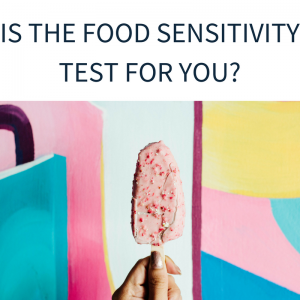 Food sensitivity is not a disease. However, it may play a role in causing disease or worsening certain symptoms. A protein called zonulin regulates the permeability of the connection between cells in the digestive tract. Zonulin is up-regulated by gluten and pathogenic bacteria, leading to increased intestinal permeability; also called “leaky gut” [1]. With increased permeability in the gut, larger molecules that normally stay in the gut can cross into the bloodstream and induce an immune reaction. Chronic irritation to the digestive tract from a highly reactive food (IgG reactive food) can accelerate the inflammatory process in the gut wall and make matters worse.
Food sensitivity is not a disease. However, it may play a role in causing disease or worsening certain symptoms. A protein called zonulin regulates the permeability of the connection between cells in the digestive tract. Zonulin is up-regulated by gluten and pathogenic bacteria, leading to increased intestinal permeability; also called “leaky gut” [1]. With increased permeability in the gut, larger molecules that normally stay in the gut can cross into the bloodstream and induce an immune reaction. Chronic irritation to the digestive tract from a highly reactive food (IgG reactive food) can accelerate the inflammatory process in the gut wall and make matters worse.
Your body can react to different foods in a variety of ways. There is growing evidence to support both the short-term and long-term benefits of eliminating IgG reactive foods from an individuals diet. Migraine headaches, irritable bowel syndrome, fatigue, weight gain and eczema have all been associated with continued consumption of reactive foods. Undiagnosed food sensitivities can also present as:
- Rashes
- Mood and memory disturbances
- Behavioural problems
- Bronchitis
- Asthma
- Joint pain
- Muscle stiffness
- Nausea
- Diarrhea
- Abdominal pain
- Gas
- Bloating
It can be difficult to determine what specific food is responsible for a given reaction. An IgG Food Sensitivity test is an effective way of determining which foods are causing an individuals reaction. IgG food sensitivities can present hours to days after the consumption of a food, further illustrating the desire to test.
Upon receiving your individual test results, an elimination diet of the reactive foods along with a gut healing protocol are suggested to ensure proper healing of the digestive tract. Most people see improvements within a few weeks of their protocol, however as with any treatment results may vary from individual to individual.
References:
[1] Hanna Karakuła-Juchnowicz, Patrycja Szachta, Aneta Opolska, Justyna Morylowska-Topolska, Mirosława Gałęcka, Dariusz Juchnowicz, Paweł Krukow & Zofia Lasik (2016) The role of IgG hypersensitivity in the pathogenesis and therapy of depressive disorders, Nutritional Neuroscience, 20:2, 110-118, DOI: 10.1179/1476830514Y.0000000158
